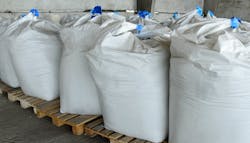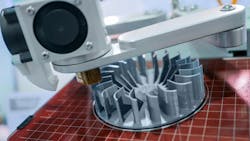Opportunities for investment and innovation in powder and bulk solids handling and dry processing
The powder and bulk solids sector is essential to the global supply chain. The sector’s activity accounts for 70% of the manufacturing lifecycle of every product on earth: from making the vegan protein shake mix for sale in high-end supermarkets to designing the pneumatic conveying systems that move metal powders for additive manufacturing. The powder and bulk solids sector helps prevent dust explosions in sawmills and grain silos and keeps critical businesses like pharmaceutical plants and industrial bakeries running. Across the globe, a small community of specialist engineers, designers and scientists use silos, hoppers, blenders and other equipment to move and process powders and bulk solid material. Unlike liquids and gases, powders and bulk solids do not flow easily or predictably, making the engineering challenges difficult and messy.
Like the rest of the larger manufacturing sector, the powder and bulk solids sector has for years faced an existential crisis in the form of a talent crunch. According to a 2018 skills gap study by Deloitte and The Manufacturing Institute, 488,000 jobs for skilled workers in the U.S. manufacturing industry remain unfilled due to a skills gap crisis, a deficit that was expected to grow to 2.4 million by 2028. The COVID-19 pandemic accelerated this trend, brutally answering once theoretical questions about what would happen if the plant floors were emptied, or nearly emptied, of workers and engineers.
Combined with spikes in demand for critical goods, these circumstances have converged to spark renewed interest in reshoring supply chains and drive increased spending on capital equipment in the sector. Automation, advanced modeling and simulation, and even human augmentation technologies will enable stronger, more agile powder and bulk solids supply chains for the things we use every day. Timothy A. Bell, a retired Senior Engineering Fellow from the DuPont Engineering Technology Center, provided key insights on the raging effects of the pandemic on the industry at The Powder Show Digital Flow Keynote session, The Essential Business – The Powder & Bulk Solids Sector in the Pandemic. Bell explained that when the pandemic induced a toilet paper shortage earlier this year it was not because there was not enough toilet paper. It was because the production facilities were not set up properly for shifting manufacturing production between residential and commercial toilet paper when demands suddenly changed. The powder and bulk solids industry sector appeared ill-equipped to support the sudden demand shift which caused magnified trouble in upstream levels of the supply chain and manufacturing. The sad result was that supply could not keep up with consumer demand.
The pandemic has revealed the critical need for the powder and bulk solids sector to implement more advanced manufacturing technologies. As the conference producer of the International Powder & Bulk Solids (iPBS) Conference & Exhibition, the longest-running and largest powder and bulk solids technology event in the Western Hemisphere, I cannot stress enough the need, as well as opportunity, for advanced technology companies, automation firms, startups and those in the additive manufacturing space to focus on such investments in the powder and bulk solids sector. Where are the opportunities for innovation and investment in this most essential business?
Advanced technology companies — automation firms
For advanced technology companies and automation firms, innovation opportunities abound in powder and bulk solids. COVID-19 has exposed an overdependence on manual processes, with some estimating that 90% of all manufacturing processes are still manual. The clarion has sounded for increased automation and agility in integrating all forms of powders and bulk solids to a plethora of diverse manufacturing processes. This will also require a deeper understanding of the behavior of powders and dry materials. Advanced computational modeling and simulation methods, such as computational fluid dynamics and discrete element methods, can help — but experts say that we are 10 years away from being able to simulate the behavior of millions or billions of particles at once. More research and innovation are needed.
Startups
For startups, there is a monumental opportunity to innovate and disrupt, particularly in the hermetic powder and bulk solids segment of our industry. Areas of focus should be on manufacturing analytics, modeling and simulation, and human augmentation.
Additive manufacturing
Additive manufacturing has seen rapid adoption. A recent World Additive Manufacturing Market Report (2020) predicts the Global Additive Manufacturing market to reach $23.75 billion by 2027, which projects a 14.4% annualized growth rate. Powder and bulk solids is a crucial component to additive manufacturing and its related technology and processes such as 3D printers makes prime use of powders and bulk solids in creating and optimizing products. If you are a venture capital or private equity investor, please don’t miss out on this sustainable and impact investment opportunity.
In closing, the powder and bulk solids industry is being pushed by enormous and powerful social and economic forces, including a global pandemic that may have forever changed how we interact and work. We must educate ourselves on these marketplace dynamics and work together to support the dramatic technology changes and new automated infrastructure that will make the scores of current and future products based upon our industry of higher quality, more cost-effective and available to the masses of consumers who want and need them in their daily lives.
Yale Deskins is the Conference Producer of the International Powder & Bulk Solids (iPBS) Conference & Exhibition, the only B2B event in the Western Hemisphere dedicated to powder, bulk solids handling, and dry material processing technology and engineering, and the Powder Show Digital Flow, an ongoing series of digital events produced by iPBS.
About the Author
Yale Deskins
Conference Producer of the International Powder & Bulk Solids (iPBS) Conference & Exhibition
Yale Deskins is the Conference Producer of the International Powder & Bulk Solids (iPBS) Conference & Exhibition, the only B2B event in the Western Hemisphere dedicated to powder, bulk solids handling, and dry material processing technology and engineering, and the Powder Show Digital Flow, an ongoing series of digital events produced by iPBS.

